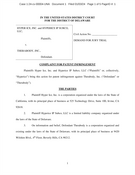-
Smart Wearable Technologies Inc. v. Huawei Technologies USA Inc. DC
- 3:17-cv-00020
- W.D. Va.
- Judge: Glen E. Conrad
- Filed: 03/14/2017
- Closed: 06/19/2017
- Latest Docket Entry: 06/19/2017
- PACER
- Docket updated daily
1
Plaintiff
1
Defendant
1
Accused
Product
1
Patent-in-Suit
98
Days in
Litigation
-
Smart Wearable Technologies Inc. v. Huawei Technologies USA Inc. DC
- 3:17-cv-00020
- W.D. Va.
- Judge: Glen E. Conrad
- Filed: 03/14/2017
- Closed: 06/19/2017
- Latest Docket Entry: 06/19/2017
- PACER
- Docket updated daily
Cause of Action
Infringement
Market Sector
Consumer Electronics and PCs
Assigned Judge
- Patent Information
